F. H. Lloyd & Company
Limited - Sporting Activities
|
|
There were many sporting clubs and teams at James
Bridge works, including the bowling club, golf club,
swimming club, tennis club, angling club, football and
cricket clubs, a table tennis club, a pigeon flying
club, and darts, snooker, rifle shooting, and crib
teams. The football club, which started in 1913 was
formed by Mr. W. Rickuss, a dresser in the fettling
shop, and later the trainer at Darlaston Football Club.
The team initially played on several football pitches
including the Robin Hood ground, The Meadows, and Wood
Green ground, until the opening of the work's sports
ground in 1920. For several years the team played in the
Darlaston Workshop League, in which they came top of the
league and won the cup. In 1914 the team was abandoned
because many of the players went into the armed forces.
After the war the team reformed and played in the Wolverhampton
Works League, before moving to the Walsall Works League.
In the late 1930s the team returned to the Wolverhampton
Works League, where it remained. An apprentice's
football team was formed in the early 1950s, which became
very successful. |
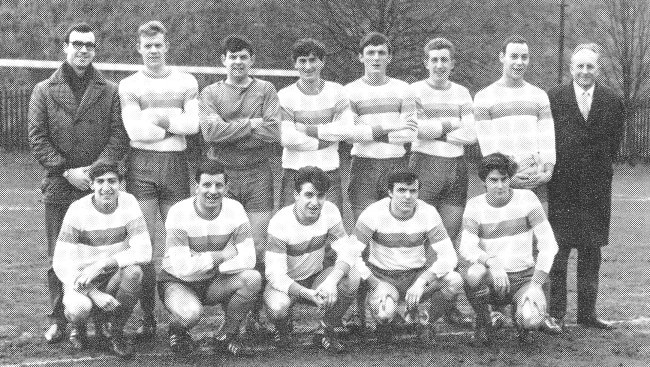
The 1966 first football eleven
team. Back row left to right: R. Perry, T. Bowen, D.
Matthews, P. Phillips, W. Jacobs, B. Franks, A. Bytheway,
and B. Heitzman.
Front row left to right: E. Reynolds, M. Jones, T.
Jenkins, R. Jenkins, and P. Morris. |
| Bernard Heitzman receives an
award in 1970 for his many years of devoted service to
the football club. The
football team played in the Wolverhampton Works League,
and the apprentices football team played in the Walsall
Minor League, the F. H. Lloyd Minor League, and the
Staffordshire County Cup. |
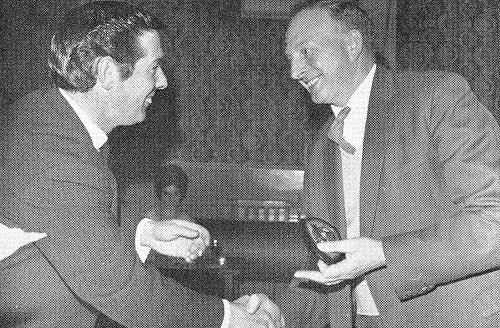 |
| In 1971Trevor Bowen took over as football team
manager of the work's first team, which competed in the
Wolverhampton Works Premier Division. The first eleven
competed in the J. W. Hunt Cup on behalf of the
Wolverhampton charity for the blind. The second team's
manager was Stanley Grainger. They competed for the
Wednesbury Charity Cup. The third team's manager was
David Knock. The team also competed for the Wednesbury
Charity Cup, which was won by Lloyds in 1976. |

The F. H. Lloyd reserves in 1972.
Back row left to right: G. Bagnall, M. Dolan, D. Busby,
G. Loundes, B. Hill, A. Daker, B. Adams, C. Bayley, B.
Pitt, and J. Hunt.
Front row left to right: C. Kirk, K. Carter, J. Welch,
M. Glover, R. Stackhouse, and V. Johnson. |
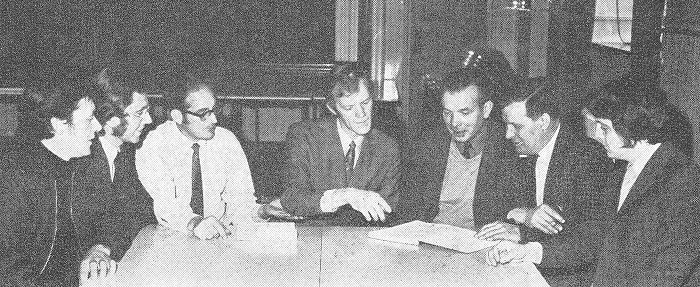
The football committee in 1972.
Left to right: E. Baggott, J. Gardner, J. Welch, T.
Bowen, T. Busby, J. Hunt, and M. Dolan. |
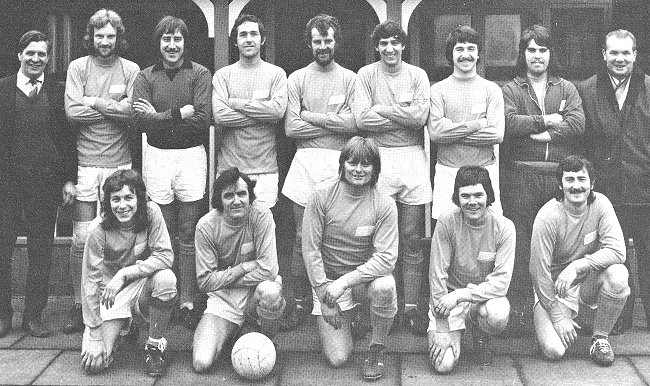
The 1973 first team. Back row left
to right: Jack Hunt, Keith Turton, Brian Parry, Tony
Bardell, Bill Startin, Ted Reynolds, John Jenkins, Chris
Kirk, and Tommy Busby.
Front row left to right: Peter Jenkins, Tommy Jenkins,
Mac Shinton, Michael Mossley, and Peter Phillips. |
|
On Saturday, the 16th
August, 1952 the first county bowls match to be
held on the company’s bowling green took place.
It was the Crosfield Cup match between
Staffordshire and Shropshire which was played in
two parts, twelve ends at James Bridge, and
another twelve at Shrewsbury. The green was in
excellent condition, and the game took place on
a fine sunny day. About 250 spectators enjoyed
the match which ended with only twelve points
separating the teams. |
|
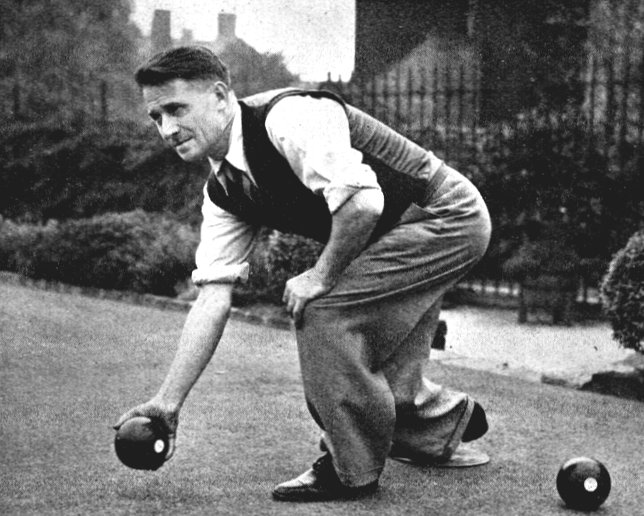
A. Duckett on the green.
From 'The Steel Casting', courtesy of Wendy
Marston. |
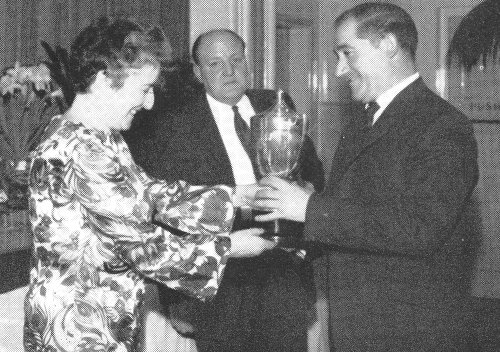 |
The angling club held an
annual dinner and dance at the James Bridge works
canteen. In the photo, Mr. I. Pinto is
being presented with the Ken Wheeler Heaviest Fish
Trophy by Mrs. M. C. Lloyd at the 1966 annual dinner and
dance.
The angling club had around 70
members and competed in the Coleman Cup, the Allison
Cup, and the annual Inter-Works Contest. |
|
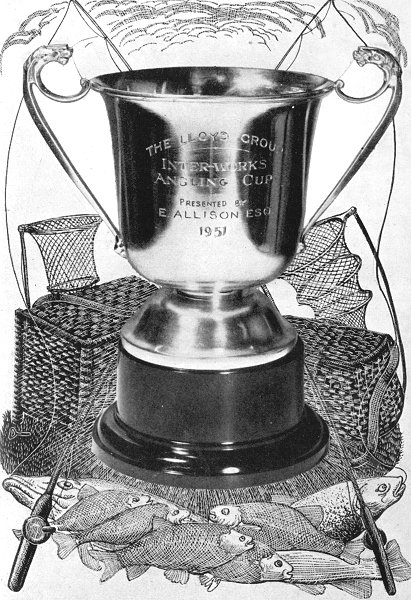
The Allison Cup. From 'The
Steel Casting', courtesy of Wendy Marston. |
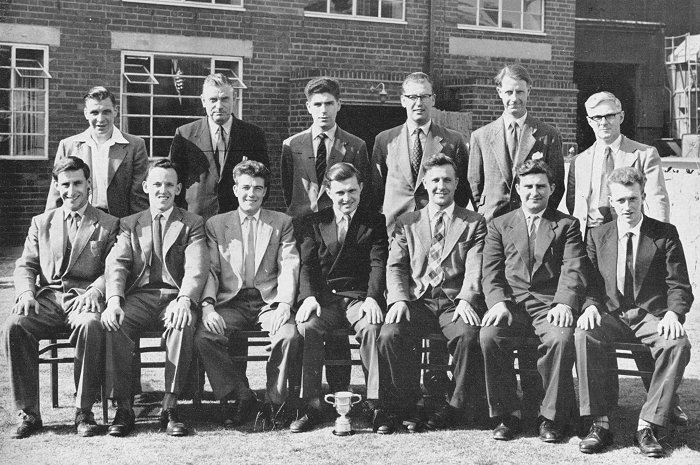
Members of the engineering
staff cricket team, known as the Drawing Office
Assassins. They won the interdepartmental knock
out cricket cup in 1959. From 'The Steel
Casting', courtesy of Wendy Marston. |
| Mr. T. Hall (left) receiving
the Crib Cup from Mr. W. Norris Winn in 1970.
The crib team competed in the
Darlaston Works Welfare League. The prize was awarded
after the team came top in the league. |
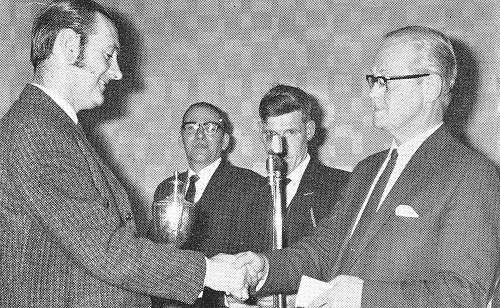 |
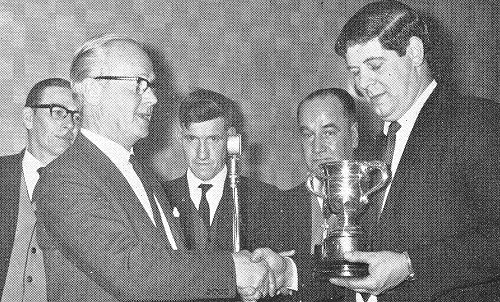 |
Mr. B. Powell receiving the
Snooker Cup from Mr. W. Norris Winn in 1970 after the
works team had come top in the Darlaston Works Welfare
League. |
| In 1971 the work's cricket team competed in the
Express & Star competition, and managed to reach the
second round before being beaten by Kingswinford. The
team also played against other teams in the Lloyd Group. |
| The work's tennis club played in the Walsall Park
League Division in which they were very successful.
There were first, second and third work's teams. The
work's Golf club travelled to many golf courses and travelled
as far afield as Llandiloes and Lincoln. Members
competed for the F. N. Lloyd Trophy, and the spring and
autumn medals. There was also the table tennis club who
played in the Darlaston, Wednesbury, and District Table
Tennis League, |
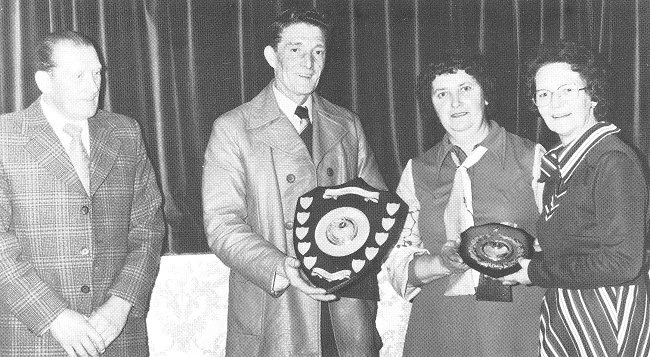
Pigeon flying was once a popular
hobby in the Black Country, and enjoyed by many factory
workers, including some at James Bridge Steel Works, who
founded the F. H. Lloyd pigeon club. Their birds took
part in many races, starting in a number of locations
including Weymouth, which was to be the starting point
for the September 1976 Young Bird Race. Unfortunately
due to bad weather the race was delayed and eventually
started from Bath. The race was won by Mr. and Mrs. Owen
Swift who are seen above receiving the Connie Everton
Trophy from Connie Everton who is on the far right. On
the left is club president Jim Steptoe. |
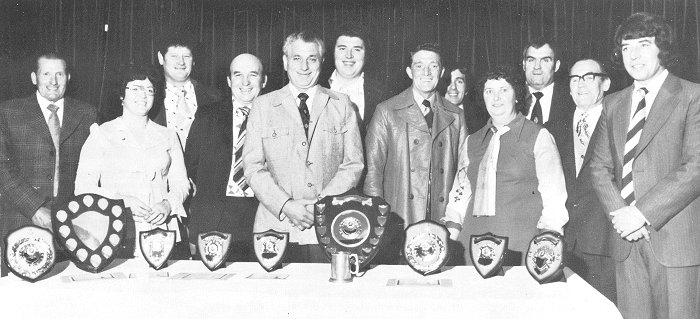
Members of the pigeon club, and
the trophy winners. Left to right: Jim Steptoe, Mr. and
Mrs. Hall, J. Mears, J. Heap and Son, Owen Swift, K.
Booker, Mrs. Swift, P. Morris, D. Battison, and M.
Battison. |
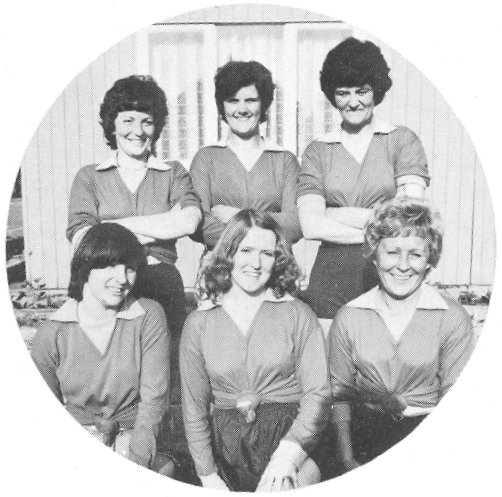 |
The F. H. Lloyd five-a-side
football competition began in 1971 as a purely male
affair. Teams competed for the Tom Rutter Memorial
Trophy with names such as The Brownswood Bombers, The
Trojans, The Lolly Pigs, and J2 Sons of Rest.
Ladies five-a-side began in 1976
with The Foundry Fillies, and The Machine Shop Girls.
On the left are the members of
the winning team, The Foundry Fillies. Back row left to
right: Lin Harris, Margaret Sheppard, and June Lee.
Front row left to right: Maureen Tillson, Joan Baggott,
and Gywen Castree. |
| The Machine Shop Girls.
Back row left to right: Rhoda
Lennard, Corrine Wilkes, and Carol Lennard.
Front row left to right: Debera
Joych, and Dorothy Devey. |
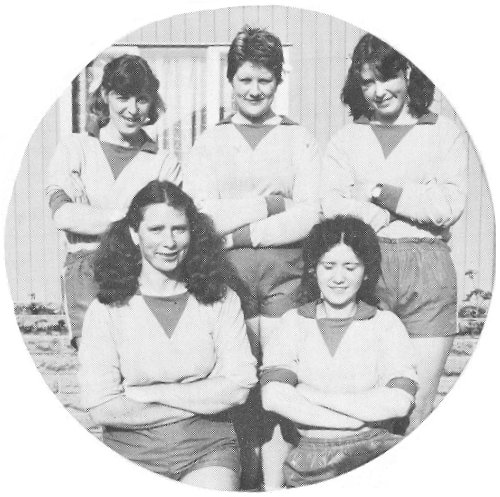 |
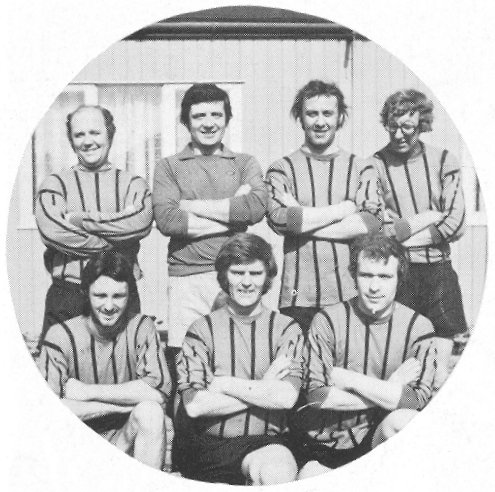 |
Winners of the Tom
Rutter Memorial Trophy in 1976 were J2 Sons of Rest,
seen opposite. Back row
left to right: Alan Preece, Alan Longmore, Michael
Dulleston, and Paul Chapman.
Front row left to right: Ernest
Baggott, David Hughes, and Brian Tillson. |
| The work's bowling club played in the Darlaston
Works Social League, Division 3. In 1962 they finished
in 5th place. The team also competed against other
factory teams in the Lloyd Group. The swimming club met
at Darlaston Baths on Thursday evenings between 8
p.m. and 9 p.m. There was also a bowling club,
a darts team, and a rifle shooting team. |
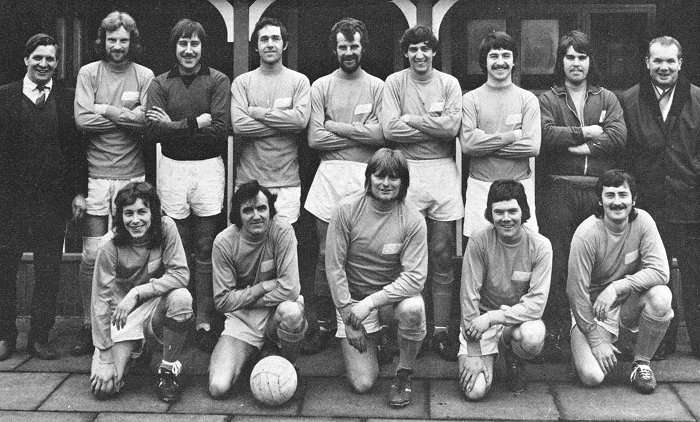
F. H. Lloyd's first football
team in 1973. Back row left to right: Jack Hunt,
secretary; Keith Turton; Brian Parry; Tony Bardell;
Bill Startin; Ted Reynolds; John Jenkins, captain;
Chris Kirk; and Tommy Busby, committee member. Front
row left to right: Peter Jenkins; Tommy Jenkins,
manager; Mac Shinton; Michael Mossley; and Peter
Phillips. From 'The Steel Casting', courtesy of
Wendy Marston. |
 |
|
 |
|
 |
Return to
personalities |
|
Return to
the contents |
|
Proceed to
social activities |
|